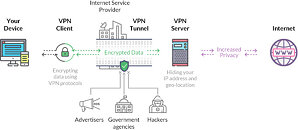Raevenlord
News Editor
- Joined
- Aug 12, 2016
- Messages
- 3,755 (1.15/day)
- Location
- Portugal
| System Name | The Ryzening |
|---|---|
| Processor | AMD Ryzen 9 5900X |
| Motherboard | MSI X570 MAG TOMAHAWK |
| Cooling | Lian Li Galahad 360mm AIO |
| Memory | 32 GB G.Skill Trident Z F4-3733 (4x 8 GB) |
| Video Card(s) | Gigabyte RTX 3070 Ti |
| Storage | Boot: Transcend MTE220S 2TB, Kintson A2000 1TB, Seagate Firewolf Pro 14 TB |
| Display(s) | Acer Nitro VG270UP (1440p 144 Hz IPS) |
| Case | Lian Li O11DX Dynamic White |
| Audio Device(s) | iFi Audio Zen DAC |
| Power Supply | Seasonic Focus+ 750 W |
| Mouse | Cooler Master Masterkeys Lite L |
| Keyboard | Cooler Master Masterkeys Lite L |
| Software | Windows 10 x64 |
Microsoft is seemingly looking to add an integrated VPN (Virtual Private Network) to its Edge browser. A company blog post details the new Microsoft Edge Secure Network feature, which was developed in partnership with internet services provider Cloudflare. The feature will be initially deployed in Preview form, and isn't currently available in Canary and Dev releases of the browser.
According to Microsoft, Secure Network for Edge aims to increase users' security as they browse through unprotected - or less-than-ideally-protected - networks. In a day and age where hacking (in its various forms) is a daily occurrence, the company aims to help Edge users access the World Wide Web through what it describes as an encrypted, secure network. And if the partnership with Cloudflare pricked your ears at possible data collection issues, you can apparently rest assured: Cloudflare says it will only keep the required diagnostic and support data for a period of 25 hours after the last log-off. Do remember that the Edge sign-in requirement means that more of your data will be made available to Microsoft. But considering the added security and ease of use of a browser-embedded VPN and the increased privacy from all other data collection agents, most users will likely feature a net gain in privacy.


Other browsers, such as Opera, already integrate a VPN, and there are a number of extension-based alternatives for Chromium-based browsers. Microsoft's Edge Secure Network feature will be integrated into the browser, and users who sign-in to their Microsoft account on Edge can count on a "freeish" approach to billing. Microsoft says up to 1 GB of Internet traffic will be available for all users - thus standing to reason that additional traffic will be billed. That'll still likely be enough for users who want to conduct more sensitive internet operations like home-banking, but is a laughable amount for most internet usage patterns. Microsoft didn't announce pricing for the feature
View at TechPowerUp Main Site | Source
According to Microsoft, Secure Network for Edge aims to increase users' security as they browse through unprotected - or less-than-ideally-protected - networks. In a day and age where hacking (in its various forms) is a daily occurrence, the company aims to help Edge users access the World Wide Web through what it describes as an encrypted, secure network. And if the partnership with Cloudflare pricked your ears at possible data collection issues, you can apparently rest assured: Cloudflare says it will only keep the required diagnostic and support data for a period of 25 hours after the last log-off. Do remember that the Edge sign-in requirement means that more of your data will be made available to Microsoft. But considering the added security and ease of use of a browser-embedded VPN and the increased privacy from all other data collection agents, most users will likely feature a net gain in privacy.


Other browsers, such as Opera, already integrate a VPN, and there are a number of extension-based alternatives for Chromium-based browsers. Microsoft's Edge Secure Network feature will be integrated into the browser, and users who sign-in to their Microsoft account on Edge can count on a "freeish" approach to billing. Microsoft says up to 1 GB of Internet traffic will be available for all users - thus standing to reason that additional traffic will be billed. That'll still likely be enough for users who want to conduct more sensitive internet operations like home-banking, but is a laughable amount for most internet usage patterns. Microsoft didn't announce pricing for the feature
View at TechPowerUp Main Site | Source








